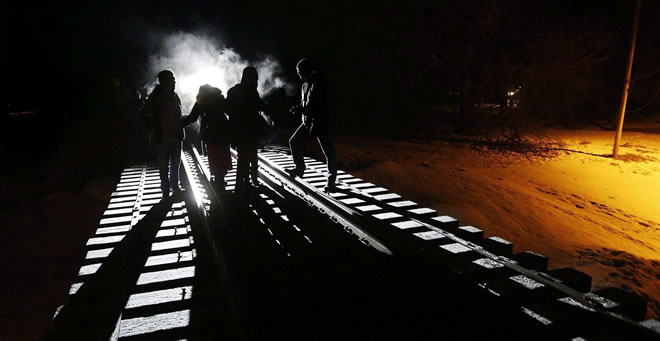
By: Dylan Robertson
Saturday August 26, 2017

JOHN WOODS / THE CANADIAN PRESS FILES - Migrants cross into Canada from the United States by walking down a rail line in the early hours of Feb. 26, 2017, near the town of Emerson, Man. Canadian officials are concerned that the U.S. will end a special visa waiver for Somalis and Liberians that Minnesota groups say could cause Manitoba to face an influx of African asylum seekers next fall.
OTTAWA — Manitoba could face hundreds more African asylum seekers crossing from the United States as that country winds down a temporary-stay program. It’s unclear whether Ottawa is doing anything to stem the flow.
"Canada is presented as the best way out of this complicated situation," Abdullah Kiatamba, executive director of African Immigrant Services — a Minnesota-based non-profit organization — said.
Since 1990, the U.S. has granted temporary protected status (TPS) to citizens of countries people can’t return to due to war, pandemic or natural disasters. In recent years, the U.S. has offered citizens of 13 countries short-term work permits and shielded them — unless they have criminal convictions — from deportation due to problems in their home countries.
But the U.S. seems to be winding that program down.
Meanwhile, thousands of people are crossing irregularly into Canada. They avoid border stations that can send them back to the U.S. and instead wander into Canada through fields — something that would be normally be illegal, but is allowed under international law for people claiming asylum.
In May, the U.S. announced it would strip Haiti from its TPS list in January 2018, with the county stabilizing since its disastrous 2010 earthquake. Since then, more than 7,000 Haitians have crossed into Quebec.
Also in May, the U.S. removed Guinea, Liberia and Sierra Leone from its TPS list, saying all three West African countries saw a decline in the Ebola virus. Roughly 5,000 people were eligible when those countries joined the list in 2014, including students, tourists and workers whose visas expired, as well as people with failed asylum claims.
Kiatamba said between 200 and 500 of them are still in Minnesota, struggling to plan for their future.
Meanwhile, citizens of Liberia who arrived in the U.S. earlier have been protected under a separate American safeguard since 2007. But the "deferred enforced departure," due to the country’s political instability, is set to expire in March 2018. Kiatamba believes more than 10,000 people will be affected.
"A good number of people have said that Canada is one option, perhaps the best option," Kiatamba said, adding he knows about 10 people who have crossed into Manitoba.
He said they’ve read mixed things online about how to immigrate to Canada or claim asylum, and that many aim to work in factories or nursing homes. "They will be an asset to the Canadian society; they won’t be a drain or a liability."
He said while Ebola is no longer spreading, West Africa’s been economically devastated by the disease, leaving people with nothing to return to and no fewer paths toward U.S. citizenship at a time of rising anti-immigrant rhetoric. "They don't look at the humanity of people; they see us as a threat," said Kiatamba.
Manitoba groups serving immigrants say they’ve encountered mostly people from Somalia and Ghana crossing near Emerson. While Ghana has not been part of the TPS list, Kiatamba said he’s heard from Ghanaians intending to reach Canada.
While citizens of Somalia have had a roughly 55 per cent acceptance rate in Canadian refugee hearings, less than half of those seeking asylum from the four West African countries have succeeded.
In Minneapolis, the director of the Somali Education and Social Advocacy Council says the majority of Somalis in the U.S. arrived through programs that grant permanent residency, so few would care about a TPS.
"That doesn't mean you won't see a rush of people crossing into Canada from the Somali community," said Abdirizak Bihi, noting, however, those without clear immigration status might get the idea of going to Canada.
U.S. Citizenship and Immigration Services say it will announce whether Somalia "continues to meet the statutory conditions for TPS" at least 60 days before its Sept. 17, 2018, deadline. Spokeswoman Sharon Scheidhauer said the government "looks at each TPS country individually."
Bihi, who hosts radio and television shows for Somalis in Minnesota, said he’s not heard of any Canadian government messaging about the country’s asylum system. Ottawa did not respond to Thursday questions about whether it is trying to dissuade people from crossing.
In February, some Somalis in Minneapolis told the Free Press they were considering a move to Canada amid rising anti-immigrant sentiment, with even those on track to gain U.S. citizenship fretting over their future.
Abdikheir Ahmed, director of Immigration Partnership Winnipeg, said media coverage itself could drive Somalis in the U.S. towards Canada, especially with reports of increased deportations.
"As soon as this information gets out, then you'll likely see people rushing for a place of safety," he said, adding the public should remember Canada has a rigorous system for determining who gets asylum.
"When you look at the pressure of refugees on countries, what we see across our border is miniscule," he said. "We should not look at ways that deter genuine refugees from seeking protection."
Earlier this week, Reuters news service reported unnamed government sources said the Liberals are worried about an onslaught of Central Americans claiming asylum next fall if the U.S. drops them off the TPS list.
The report did not say which provinces the government would expect people to enter and claim asylum. It claimed Ottawa is particularly worried about an uptick in arrivals a year before the 2019 federal election.
[email protected]